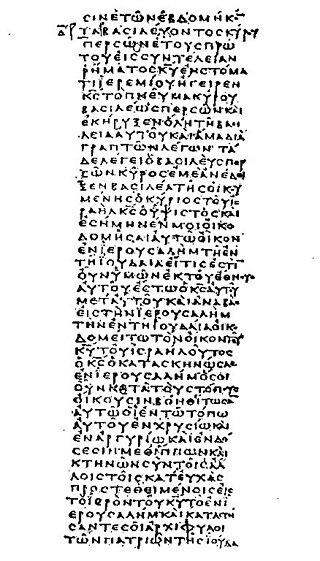
The First Epistle to the Corinthians is one of the Pauline epistles, part of the New Testament of the Christian Bible. The epistle is attributed to Paul the Apostle and a co-author, Sosthenes, and is addressed to the Christian church in Corinth. Despite the name, it is not believed to be the first such letter. Scholars believe that Sosthenes was the amanuensis who wrote down the text of the letter at Paul's direction. It addresses various issues that had arisen in the Christian community at Corinth and is composed in a form of Koine Greek.

The Septuagint, sometimes referred to as the Greek Old Testament or The Translation of the Seventy, and often abbreviated as LXX, is the earliest extant Greek translation of the Hebrew Bible from the original Hebrew. The full Greek title derives from the story recorded in the Letter of Aristeas to Philocrates that "the laws of the Jews" were translated into the Greek language at the request of Ptolemy II Philadelphus by seventy-two Hebrew translators—six from each of the Twelve Tribes of Israel.

Perseverance of the saints is a Christian teaching that asserts that once a person is truly "born of God" or "regenerated" by the indwelling of the Holy Spirit, they will continue doing good works and believing in God until the end of their life.

Joseph Augustine Fitzmyer was an American Catholic priest and scholar who taught at several American and British universities. He was a member of the Society of Jesus (Jesuits).
The idea of corporate election expresses a Christian soteriological view that understands Christian salvation as based on "God choosing in Christ a people whom he destines to be holy and blameless in his sight". Put another way, "Election is the corporate choice of the church 'in Christ.'" Paul Marston and Roger Forster state that the "central idea in the election of the church may be seen from Ephesians 1:4": "For he [God] chose us [the Church] in him [Christ], before the creation of the world to be holy and blameless in his sight." William Klein adds:
Here [in Ephesians 1:3-4] Paul states that God chose Christians in Christ before the creation of the world to be holy and blameless in his sight. The "chosen ones" designate the corporate group to whom Paul writes with himself included: God chose us. The focus is not on the selection of individuals, but the group of those chosen. As Westcott notes, "He chose us for Himself out of the world." Paul specifies the timing of this choice—it was pretemporal, before the world was created. God made the choice "in him". In other words, Christ is the principal elected one, and God has chosen a corporate body to be included in him."
The conditional preservation of the saints, or conditional perseverance of the saints, or commonly conditional security, is the Arminian Christian belief that believers are kept safe by God in their saving relationship with him upon the condition of a persevering faith in Christ. Arminians find the Scriptures describing both the initial act of faith in Christ, "whereby the relationship is effected", and the persevering faith in him "whereby the relationship is sustained." The relationship of "the believer to Christ is never a static relationship existing as the irrevocable consequence of a past decision, act, or experience." Rather, it is a living union "proceeding upon a living faith in a living Savior." This living union is captured in the simple command by Christ, "Remain in me, and I in you".

Apostasy in Christianity is the repudiation of Christ and the central teachings of Christianity by someone who formerly was a Christian (Christ-follower). The term apostasy comes from the Greek word apostasia meaning "rebellion", "state of apostasy", "abandonment", or "defection". It has been described as "a willful falling away from, or rebellion against, Christianity. Apostasy is the rejection of Christ by one who has been a Christian. …" "Apostasy is a theological category describing those who have voluntarily and consciously abandoned their faith in the God of the covenant, who manifests himself most completely in Jesus Christ." "Apostasy is the antonym of conversion; it is deconversion."
Ian Howard Marshall was a Scottish New Testament scholar. He was Professor Emeritus of New Testament Exegesis at the University of Aberdeen, Scotland. He was formerly the chair of the Tyndale Fellowship for Biblical and Theological Research; he was also president of the British New Testament Society and chair of the Fellowship of European Evangelical Theologians. Marshall identified as an Evangelical Methodist. He was the author of numerous publications, including 2005 Gold Medallion Book Award winner New Testament Theology.

Roy Alvin Harrisville II was an American Lutheran theologian who wrote extensively on the interpretation of the New Testament.
Yung Suk Kim is a Korean-American biblical scholar. Kim is professor of New Testament and early Christianity at the Samuel DeWitt Proctor School of Theology. He studied in Korean and American schools. Kim obtained a PhD in New Testament studies from Vanderbilt University in 2006, an M.Div. from McCormick Theological Seminary in 1999, and a B.A. from Kyungpook National University in 1985. He is the editor of the Journal of Race, Ethnicity, and Religion.
Craig S. Keener is an American Protestant theologian, Biblical scholar and professor of New Testament at Asbury Theological Seminary.
John Lawrence McKenzie (1910–1991) was an American Catholic biblical scholar.
Richard A. Horsley was the Distinguished Professor of Liberal Arts and the Study of Religion at the University of Massachusetts Boston until his retirement in 2007.
Daniel Isaac Block is a Canadian/American Old Testament scholar. He is Gunther H. Knoedler Professor Emeritus of Old Testament at Wheaton College.
Andrew T. Lincoln is a British New Testament scholar who serves as Emeritus Professor of New Testament at the University of Gloucestershire.
Barry G. Webb is a scholar and senior research fellow in Old Testament at Moore Theological College. He is the author of a number of scholarly books; foremost is the commentary on The Book of Judges in the New International Commentary on the Old Testament series. Numerous scholarly journals and academic religious periodicals have included articles by Webb.
Michael J. Gorman is an American New Testament scholar. He is the Raymond E. Brown Professor of Biblical Studies and Theology at St. Mary's Seminary and University, where he has taught since 1991. From 1995 to 2012 he was dean of St. Mary's Ecumenical Institute.

James Frank McGrath is the Clarence L. Goodwin Chair in New Testament Language and Literature at Butler University and is known for his work on Early Christianity, Mandaeism, criticism of the Christ myth theory, and the analysis of religion in science fiction. He received his Ph.D. from Durham University in 1998.
Mitzi J. Smith is an American biblical scholar who is J. Davison Philips Professor of New Testament at Columbia Theological Seminary. She is the first African-American woman to earn a PhD in New Testament from Harvard. She has written extensively in the field of womanist biblical hermeneutics, particularly on the intersection between race, gender, class, and biblical studies. She considers her work a form of social justice activism that brings attention to unequal treatment of marginalized groups.
Robert Donald Miller II OFS was an Old Testament theologian and biblical archaeologist at The Catholic University of America in Washington, D.C. He was also known for his Great Courses series Understanding the Old Testament. "Chieftains of the Highland Clans: A History of Israel in the Twelfth and Eleventh Centuries B.C.", published in 2005, is cited as among his best-known works.







